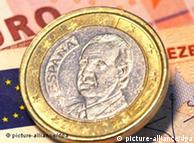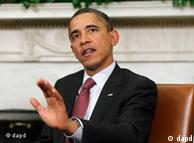TRANS-ATLANTIC RELATIONS | 28.10.2011
US and Europe play the blame game
It was pure coincidence that US President Barack Obama hosted a European in the White House on Thursday, a day after the EU summit attempted to solve Europe's debt woes.
 Brussels sent the world a positive signalThrough his talks with Czech Prime Minister Petr Necas, Obama was able to learn first-hand how European leaders planned to save their common currency.
Brussels sent the world a positive signalThrough his talks with Czech Prime Minister Petr Necas, Obama was able to learn first-hand how European leaders planned to save their common currency.Obama was seemingly satisfied: "We have seen that the countries in the eurozone and all European countries are committed and want to feel secure, despite all the complications of the European project, and this will continue."
At the beginning of October, Obama had delivered a cautionary word to the Europeans, telling EU leaders they had to act quickly or the uncertainty surrounding Greece's public finances would begin to put a serious strain on the global financial system – and also have a negative impact on the United States.
When Europe suffers, so does the US
Even back then, Obama had said that the decisions made in Brussels were an "important first step," but that "the key thing now is that this step is implemented, completely and resolutely."
In the end, he said he had great confidence in the European leadership, but Americans view Europe with a look of concern.
 Faith in the euro has dropped because of the crisis"When Europe is weak, if Europe, our biggest trade partner, doesn't grow," said Obama, "it influences our businesses and our ability to create jobs here in the US."
Faith in the euro has dropped because of the crisis"When Europe is weak, if Europe, our biggest trade partner, doesn't grow," said Obama, "it influences our businesses and our ability to create jobs here in the US."The latter matter is a key point in the run-up to next year's presidential elections, as the unemployment rate in the US currently stands at over 9 percent.
Jacob Kirkegaard of the Peterson Institute for International Economics in Washington sees the unity shown in Brussels as a positive step forward: it did not represent an end to the crisis, but the worst catastrophes have been avoided - such as Greek bankruptcy. Kirkegaard says the risk of a sudden collapse of one of the big European banks has been reduced.
"That means the risk for the US economy has been greatly reduced," he said.
Unrelated crises
Not everyone is completely convinced. Sebastian Mallaby, an economics expert of the Council on Foreign Relations, is skeptical, and points out that half of the debt relief provided by banks for Greece is solely on a voluntary basis.
The goal of getting the percentage of Greek sovereign debt down to 120 percent by 2020 is still very high, Mallaby says. The opinion, that the European debt crisis is a result of the US financial crisis, is not one that Mallaby shares.
"I think that Greece's debt has developed in an unsustainable direction, which is unrelated to what happened in the American housing credit market," he said in a teleconference with journalists, adding that the housing bubbles in Spain and Ireland were independent of the US, too.
Mallaby thinks the eurozone's monetary policy was not good fit for all the member nations and was too loose for the quickly growing nations with a high risk of rapidly rising inflation.
US as an example?
Benn Steil is a colleague of Mallaby at the Council on Foreign Relations, and he sees some correlation between the problems in the US and those in Europe.
"The problems in the US housing market were a decisive trigger for the current crisis in Europe," he said. "It revealed the significant underlying problems with the European financial market, which is very dependent on the banks."
 Americans want something done about unemploymentIn addition, says Steil, the European banks are significantly more dependent on financing from incalculable, short-term wholesale markets than US banks, which rely more on state-secured deposits. In an editorial for the Financial Times on Thursday, Obama wrote that the US wanted to continue playing a leading role as the world's biggest economy.
Americans want something done about unemploymentIn addition, says Steil, the European banks are significantly more dependent on financing from incalculable, short-term wholesale markets than US banks, which rely more on state-secured deposits. In an editorial for the Financial Times on Thursday, Obama wrote that the US wanted to continue playing a leading role as the world's biggest economy."In the US, we had 19 months of uninterrupted growth in the private sector and created 2.5 million jobs," he wrote. Even at the beginning of October, he depicted the US as a good example.
"The aggressive tactics that we used after the collapse of Lehman Brothers helped us strengthen the financial and banking sectors - the Europeans didn't follow suit."
Americans lack authority
The US has the right to point the finger at Europe to some extent, says Jacob Kirkegaard, on the issue of recapitalization of banks, for example.
The eurozone is simply not as well organized.
"The eurozone doesn't have a common finance ministry like the US," Kirkegaard said, making a comparison unfair.
America's image has taken a hit, and the country's influence is not as high as it once was, says Sebastian Mallaby, because the Europeans are blaming the crisis on the US.
"We don't have the moral authority to say, listen, we know how economic policy works," he said, and gives the reasons: "We had the financial crisis, we had debt crises and we can't get our financial policies under control and nothing is happening in Washington and the President has a tough election coming up, despite a weak opponent."
The Europeans are, therefore, going at it alone. Unlike in the past, they also won't be able to expect much from the Americans. But the experts agree that the results from the EU summit in Brussels relieved some of the most intense pressure on countries going in to the G20 summit at the beginning of November in Cannes, France.
For that reason, there's no reason to pass the blame back and forth.
Author: Christina Bergmann / mz
Editor: Nicole Goebel
Editor: Nicole Goebel
DW


No comments:
Post a Comment